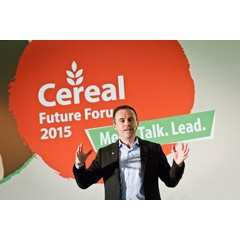Leading cereal experts discussing challenges and new approaches to enhance wheat yield and quality
About 230 experts and representatives from 30 cereal growing countries across the globe have met on February 11 and 12 at the Bayer CropScience Cereal Future Forum in Brussels, Belgium, to discuss current challenges and future opportunities in wheat production. The conference aimed to stimulate fresh perspectives on topics ranging from agronomic challenges such as integrated weed and pest management, the impact of drought and heat on yield, value chain requirements, regulatory challenges and opportunities for technology innovation with digital farming approaches.
Speakers from academia, farms, associations, industry and governmental institutions shared their individual experiences and perspectives in growing wheat around the world. The main conclusion: The global demand for wheat is rising steadily and outpacing productivity. To further increase agricultural productivity without compromising the environment, more innovation is required to ensure a sustainable intensification of wheat production.
Embracing innovation to expand the yield frontier and exploit today’s potential
Bayer CropScience has set-up a long-term innovation program to enhance global wheat productivity. The company is a market leader in crop protection products for the world’s most important crop, and started to build up a wheat seeds business in 2010 by engaging in collaborations with leading wheat research institutions and selected acquisitions. “We have a 10 year plan to invest 1.5 billion euros in the research and development of new solutions for wheat through to 2020 – encompassing both high-yielding seeds and new crop protection solutions to advance global wheat cultivation,” said Liam Condon, Chief Executive Officer at Bayer CropScience. “Seven wheat breeding stations across the crop’s main growing areas around the world are now operating, and the first seeds are currently being sold in Eastern Europe. Hybrid seed varieties with improved yield are expected to be ready for market after 2020 – an example for the long-term nature of our business,” Condon further explained.
“The challenge is significant,” said Steve Patterson, Global Crop Manager Cereals at Bayer CropScience. “Collaboration is essential. We have to focus on the needs of farmers, both the large-scale operations in industrialized countries but also small-scale farmers in developing countries. Agronomy can make a difference as well as technology – digital farming, new cultivation systems and machinery which enable this. In addition, we all have a role to play to communicate the needs and benefits of modern farming. And we need to explain the science behind the technology to support a predictable and science-based regulatory environment.”
Being committed to dialogue and collaboration, Bayer CropScience has established the series of dedicated Crop Future Forums to provide a networking platform on the future of key agricultural crops. “With our Crop Future Forums we want to foster stakeholder dialog and knowledge exchange with a focus on societal trends and innovative solutions for future challenges,” said Hartmut van Lengerich, Head of Cereals, Rice, Oilseeds and Fungicide Assets at Bayer CropScience. “Cereals are an important staple crop for human diets. We are committed to addressing the future demands of a growing world population by providing innovative integrated solutions to farmers worldwide. To be able to do so, we are actively seeking to engage in dialog and join forces with cereal experts all over the world. This Future Forum was already the second one dedicated to cereals and we have been able to tie in successfully with the discussions at our first Cereal Future Forum held in 2011.”
Wheat – the oldest and most widespread food crop in the world
Wheat origins can be dated to over 12,000 years ago. With about 25 percent of the global arable land under wheat cultivation, it is today the largest cereal crop in terms of acreage and one of the world’s most important staple foods. Wheat is consumed by about 2.5 billion people in roughly 90 countries. In 2013, about 700 million tons of wheat have been harvested worldwide. Main wheat-producing regions are the European Union, China, India, North America, Russia, Australia and Pakistan. The challenges in future wheat production are manifold. In the past decade the global demand for wheat has grown faster than productivity, thus widening the global production and demand gap. Extreme weather has destabilized global wheat markets three times since the year 2000.
About Bayer CropScience
Bayer is a global enterprise with core competencies in the fields of health care, agriculture and high-tech materials. Bayer CropScience, the subgroup of Bayer AG responsible for the agricultural business, has annual sales of EUR 8,819 million (2013) and is one of the world’s leading innovative crop science companies in the areas of seeds, crop protection and non-agricultural pest control. The company offers an outstanding range of products including high value seeds, innovative crop protection solutions based on chemical and biological modes of action as well as an extensive service backup for modern, sustainable agriculture. In the area of non-agricultural applications, Bayer CropScience has a broad portfolio of products and services to control pests from home and garden to forestry applications. The company has a global workforce of 22,400 and is represented in more than 120 countries. This and further news is available at: www.press.bayercropscience.com.
Find more information at www.bayercropscience.com.
Forward-Looking Statements
This release may contain forward-looking statements based on current assumptions and forecasts made by Bayer Group or subgroup management. Various known and unknown risks, uncertainties and other factors could lead to material differences between the actual future results, financial situation, development or performance of the company and the estimates given here. These factors include those discussed in Bayer’s public reports which are available on the Bayer website at www.bayer.com. The company assumes no liability whatsoever to update these forward-looking statements or to conform them to future events or developments.
( Press Release Image: https://photos.webwire.com/prmedia/3/195838/195838-1.jpg )
WebWireID195838
This news content was configured by WebWire editorial staff. Linking is permitted.
News Release Distribution and Press Release Distribution Services Provided by WebWire.
